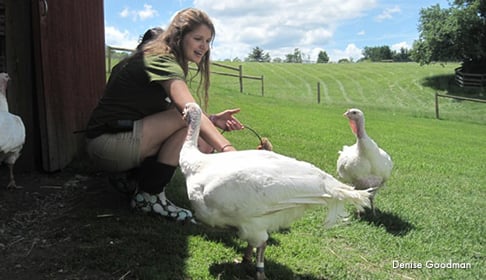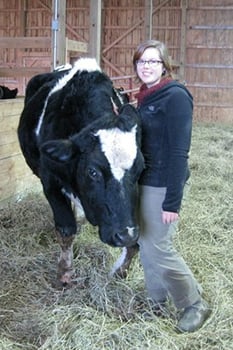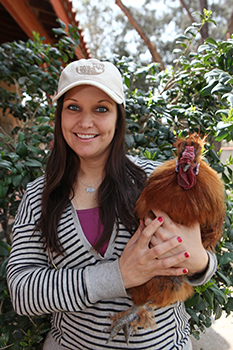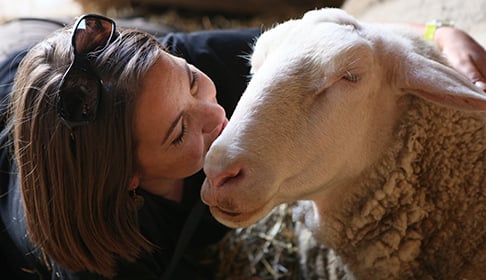By Samantha
Summer is more than half way over, but Farm Sanctuary visitor season is in full swing. At all three of our shelters, visitors can interact with rescued cattle, pigs, sheep, goats, chickens, and turkeys on guided tours. Tour guides are an excellent source of up-to-date information on animal intelligence and personality, as well as factory farming. They develop close relationships with the animals living at the sanctuaries, learning everything from their unique rescue stories and health needs, to their favorite places to be scratched. Every tour provides visitors with a special glimpse into the lives of Farm Sanctuary residents. Here, three of our fabulous tour guides give us the scoop on the extraordinary experience of introducing people to farm animals.
Which of the animals at your location are most eager to greet tour visitors?
Wendy (New York Shelter): So many! To name just a few: Our new calf, Michael, is very curious about guests. Cash, the sheep, will lean against your legs until you pet him. Daisy, the turkey, happily sits alongside visitors who stroke her feathers. And Patrick, the goat, absolutely loves attention.

Wendy with the turkeys.
Kelly (Southern California Shelter): Prince the goat — he was featured on our website when he was a baby and a lot of people have come to the shelter to meet him. He’s pretty spoiled and thinks that every guest is here just to see him.
Becky (Northern California Shelter): Our sheep and turkeys seem to be the most excited to meet visitors. I think this surprises most people!

Becky with Ms. Foreman.
What else about a Farm Sanctuary tour takes visitors by surprise?
Becky: Most visitors are surprised by the pigs — that they are so friendly, clean and large. People either don’t know what to expect or carry some misconceptions about farm animals — you know, that pigs smell and are dirty or that turkeys won’t let you touch them. The moment a person really connects with a pig and gives one a belly rub, you can see the surprise and delight light up their face.
Wendy: Many visitors to our New York shelter are familiar with the issues surrounding factory farming and want to make more compassionate food choices. They often choose cage-free eggs, organic milk, and other supposedly “humane” alternatives intending to help animals. Unfortunately, this type of labeling is a marketing ploy, not a guarantee of humane treatment. We talk about and show the truth behind labels during the tour. Time and again, I’ve seen the dismay on visitors’ faces when they meet debeaked hens who have come from “free-range” farms. Visitors are taken aback to see that these hens suffered the same abuses as the birds in battery cages do.
Kelly: Most visitors are shocked to learn that the veal industry is a byproduct of the dairy industry. I’ve seen a lot of people who might already have eliminated meat products become vegan on the spot after meeting a calf and hearing this information.
Have you seen a visit to Farm Sanctuary change someone’s mind about animals and food?

Kelly with Li Mu Bai
Kelly: Definitely! Especially when it comes to our birds. Visitors will comment on how amazing it was simply to hold a chicken or pet a turkey under her wings and how the interaction changed their view of who these animals are and what it means to eat them.
Wendy: Every visit changes someone’s mind. I’ve seen visitors moved to tears by animal rescue stories. I’ve seen skeptics who start the tour making jokes about loving bacon and end it with their arms around a pig while declaring they’ll never eat bacon again. Even if they just go home and think a little deeper about where food comes from or try out a vegetarian recipe, we’ve helped them take a step towards more compassion for farm animals.
Is there a tour experience that you’ll never forget?
Becky: In the spring of 2012, I was taking a couple and their young son to meet the special-needs cattle. A group of young calves who were new to the herd (Sonny, Tweed, Milbank, Arnold, Orlando, and Conrad) started walking toward us. The closer the calves got, the more timid they were acting, and I couldn’t figure out why. Then I realized that this was the first human child they had ever met, and they didn’t know what to make of him! Conrad started sniffing the little boy, then licking him, and the boy just started laughing and laughing. Pretty soon the other calves who were brave enough came closer and started licking the young boy too. To see the calves in their discovery process, and to see this magnificent openness between the boy and the calves, was really beautiful.
Wendy: I had the chance to take author Peter Lovenheim out to spend time with Samuel, the steer who was the subject of his book, Portrait of a Burger as a Young Calf. In his book, Peter describes purchasing two calves with the intent of watching them move through the meat industry from birth until slaughter to document the process (the other cow, Samantha, also lived at Farm Sanctuary but passed away a few years ago). He begins the experiment thinking he will have them slaughtered when the time comes, but as he gets to know the animals as individuals and learns more about the industry, he struggles with what to do. Eventually, he decides to bring them to the sanctuary rather than to slaughter. Getting to know Samuel changed Peter’s entire outlook on animals, which is what we’re trying to do at Farm Sanctuary every day. Seeing Peter’s response when he greeted Samuel – as a friend – was unforgettable .
What have you learned from being a Farm Sanctuary tour guide?
Wendy: You can read a million pamphlets and websites and still turn a blind eye to how animals are being treated. But, when you have the chance to really connect with another living being face-to-face, it’s hard to ignore that meat, milk, and eggs mean suffering for billions of real animals.

Visitor meets Cash.
Becky: At Farm Sanctuary, we get visitors from all walks of life. They have a variety of experiences when it comes to animals and food, and we understand and accept that. Farm Sanctuary emphasizes this acceptance on our tours, and I can’t even count the number of times visitors have commented on how much they appreciated our kindness and willingness to meeting them where they are.
Kelly: I’ve learned that anyone can make positive changes for farm animals and lead others to do the same. On one tour, a 14 year-old boy was so moved after meeting the chickens and discovering that birds have feelings too and want to live just as much as any other animal, that he told me he was never going to eat chicken again. And he was going to tell everyone he knew not to eat chicken either! We can all make these changes for farm animals.
For sanctuary tour times, please follow the links below.
New York Shelter (Watkins Glen)
Northern California Shelter (Orland)
Southern California (Los Angeles area)
For more information on tours, area activities, and overnight stays in our on-site cabins (New York only), check out our visitor program page.

would like to visit new york site. please send directionns
Definitely! Check out link for all the details for driving directions and more: http://www.farmsanctuary.org/the-sanctuaries/watkins-glen-ny/tours/
Just bought some so-called range free eggs now I’m sorry I did. I’m having some real problems going vegan but I do love the birds and animals so will continue to struggle with a vegan diet.
Thank You for your great work. I wish there were more Farm Sanctuary’s.
I will be in LA for the Lifestyle Expo in October. Is there a time when I can come visit the animals at the Orland site? I thought maybe Thursday (10/18), Friday (10/19), or Monday (10/21)? Also, more videos, please. I find these all very encouraging. There’s a deep rightness about them and they are all very well done.
thats such a cute chicken! I love farm sanctuary! don’t eat animals!